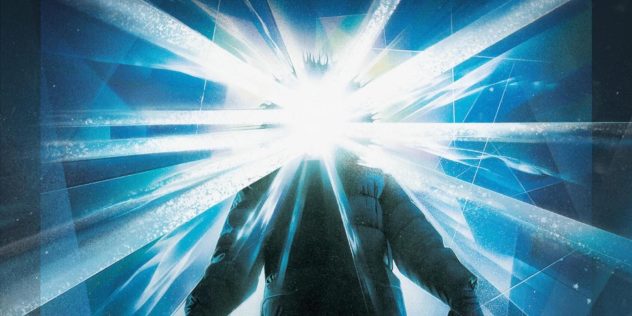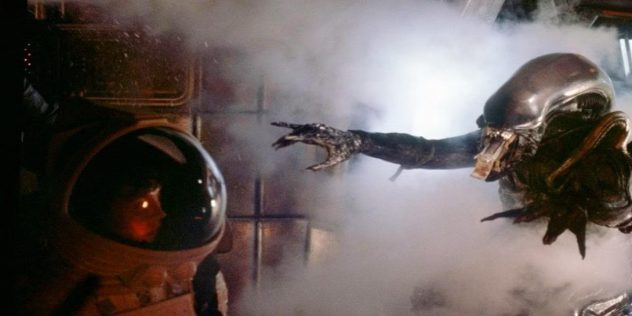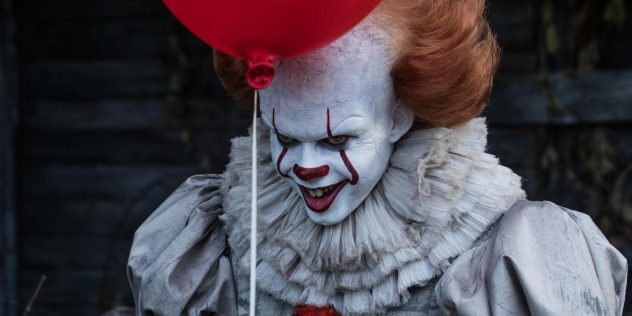
Horror has been a popular genre in the realm of cinema since the early years of filmmaking. Featuring evils consisting of conscious and unconscious concerns of the time, creators would harness their thrill off the worries and challenges belonging to the era. Threats of famishment, infidelity, and shunning would be personified through symbolic mediums such as demons, devils, and the paranormal. As concerns changed with that of the time, different expressions of these strifes would continue. However, American author H.P. Lovecraft found a way to achieve thrill from a rather otherworldly source: preying on the absurdity of life and incomprehensible cosmic vileness. The Lovecraftian Horror Subgenre was born.
Join the PERA (Personal Entertainment Research Assistant) waitlist.
The World’s Most Indispensable Movie App
The RunPee app tells you the best times to
run & pee during a movie
so you don't miss the best scenes.
Download the RunPee app.
100% free (donation supported)
The Origins of Lovecraftian Horror

Sometimes referred to as Cosmic Horror, the Lovecraftian Horror Subgenre features existential distress and otherworldly forces. Depicting entities who possess unfathomable powers, the fear garnered spawns from the lack of comprehension humans possess. The consideration of insignificance on a universal scale can cause individuals to question their purpose and overall meaning – which is arguably far more terrifying than ghosts and goblins.
Unlike mainstream horrors that rely on the bodily fears of pain and death, Lovecraftian horror goes a step beyond; digging deeper into fears worse than innate trepiditions. With nowhere to turn, viewers are subject to assuming the exact dread they can’t control. Having no power to fight against the accustomed monsters like Freddy, Chuckie, or Jason, the audience is trapped in a state of immeasurable despair.
Early in the 20th century, not too long after cinema began, Lovecraft created his initial story that would lay the foundation for the subgenera: The Call of Cthulhu. The short story covers a collection of assorted accounts and various scriptures regarding a cult’s attempt to summon a cosmic entity that thrived before humanity. Despite the cult’s efforts, their offerings didn’t fully awaken the monster and left humanity in a state of strained caution. Lovecraft would later go on to create an assortment of other stories broadening the Lovecraftian mythos.
H.P. Lovecraft’s Influence on Horror

Lovecraft’s style catapulted storytelling in an entirely different direction than where the horror genre was headed. Inspiring other storytellers, the Lovecraftian Horror Subgenre created an entire ethos surrounding these crises. Thus, birthing new concepts including Eldritch Entities, Time Travel, Ancient Gods, Pantheons, Interdimensional Beings, Dream Realms, etc. Essentially, his efforts are responsible for many of the premises found in horror movies today.
What people are saying
about the RunPee app.
January 7, 2024
Couldn’t live without this app anymore. Perfect to time my run for another glass of wine or two. Works great with my smart watch.
View all reviews
Apple App Store | Google Play Store
Download RunPee app
A fantastic example of Lovecraft’s influence over storytelling is with Stephen King’s novels, particularly, It. The shapeshifting ancient entity that possesses otherworldly abilities, also known as Pennywise, fits the Lovecraftian Horror Subgenre’s qualities to a T. With the capacity to transcend the third dimension, the threat involved supersedes the usual human dilemma. Having succeeded in using this approach to horror, King’s novel called for a film adaptation. Overwhelming other competing films in theaters, It (2017) amassed a whopping $701.8M USD at the box office. Therefore, it’s safe to say that Lovecraftian horror strikes a certain level of concern in the hearts of humanity that stands out among other horrors.
By taking a cosmic approach to scares, H.P. Lovecraft was able to change the concept of horror forever. Fundamentally altering the terrors one can fathom, his endeavors have had a profound effect on the audience’s existential perspective. Relying on playing into the insignificance of humanity on a cosmic level, stories can achieve an elevated level of fear from their viewers. Considering many have to face their common day strifes regularly, the incomprehensible might just be the ultimate horror.


Leave a Reply